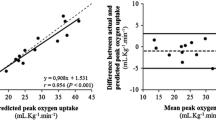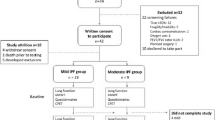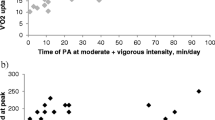Abstract
Purpose
We evaluated the validity of predicting peak oxygen uptake (\(\dot {V}\)O2peak) from submaximal ratings of perceived exertion (RPE) during incremental cardiopulmonary exercise test (CPET) in patients with cystic fibrosis (CF) and compared the predictive accuracy between overall and differentiated RPE scores.
Methods
Thirty-five adults with CF (FEV1 = 58 ± 23%) performed a CPET on cycle ergometer with gas exchange measurements. Leg, chest and overall RPE were collected every minute throughout the test. Linear regressions between \(\dot {V}\)O2 and RPE ≤ 15 were extrapolated to maximal theoretical RPE (i.e. RPE18 and RPE19) to predict \(\dot {V}\)O2peak. Agreements between measured and all predicted \(\dot {V}\)O2peak were tested using Bland–Altman Plots, for the whole group and for subjects presenting significant exercise intolerance (n = 24).
Results
Leg, chest and overall RPE increased similarly with exercise intensity. No differences were found between predicted \(\dot {V}\)O2peak and measured \(\dot {V}\)O2peak with RPE18 as maximal RPE, for both overall and differentiated RPE (P range 0.94–0.98). Ranges for Pearson correlations and limits of agreements were 0.88–0.91 and 380–461 mL min−1 for the whole group and 0.92–0.94 and 269–365 mL min−1 for subjects with significant exercise intolerance. The greatest association and narrowest limits of agreements were obtained from chest RPE scores.
Conclusions
Submaximal RPE scores obtained during CPET can provide acceptable estimate of \(\dot {V}\)O2peak in adults with CF, particularly in those having significant exercise intolerance. Future studies should assess whether the prediction can be improved, particularly by encouraging the regular use of RPE scales during physical activities/exercise rehabilitations sessions.



Similar content being viewed by others
Abbreviations
- BRImax :
-
Breathing reserve index at maximum exercise
- CF:
-
Cystic fibrosis
- COPD:
-
Chronic obstructive pulmonary disease
- CPET:
-
Cardiopulmonary exercise test
- CR-10:
-
Category-ratio 10
- HR:
-
Heart rate
- FEV1 :
-
Forced expiratory volume in 1 s
- LoA:
-
Limits of agreement
- PA:
-
Physical activity
- RPE:
-
Ratings of perceived exertion
- RPE-C:
-
Chest RPE
- RPE-L:
-
Leg RPE
- RPE-O:
-
Overall RPE
- \(\dot {V}\)O2peak :
-
Peak oxygen uptake
References
Aliverti A, Macklem PT (2001) How and why exercise is impaired in COPD. Respiration 68(3):229–239
Al-Rahamneh HQ, Eston RG (2011) Prediction of peak oxygen consumption from the ratings of perceived exertion during a graded exercise test and ramp exercise test in able-bodied participants and paraplegic persons. Arch Phys Med Rehabil 92(2):277–283
Al-Rahamneh HQ, Faulkner JA, Byrne C, Eston RG (2011) Prediction of peak oxygen uptake from ratings of perceived exertion during arm exercise in able-bodied and persons with poliomyelitis. Spinal Cord 49(1):131–135
Balady GJ, Arena R, Sietsema K, Myers J, Coke L, Fletcher GF, Forman D, Franklin B, Guazzi M, Gulati M, Keteyian SJ, Lavie CJ, Macko R, Mancini D, Milani RV (2010) Clinician’s guide to cardiopulmonary exercise testing in adults: a scientific statement from the American Heart Association. Circulation 122(2):191–225
Bart BA, Wolfel EE (1994) Method of expired gas collection during cardiopulmonary exercise testing does not affect respiratory gas exchange measurements in patients with heart failure. J Card Fail 1(1):91–96
Bland JM, Altman DG (1986) Statistical methods for assessing agreement between two methods of clinical measurement. Lancet 1(8476):307–310
Boas SR, Joswiak ML, Nixon PA, Kurland G, O’Connor MJ, Bufalino K, Orenstein DM, Whiteside TL (1996) Effects of anaerobic exercise on the immune system in eight- to seventeen-year-old trained and untrained boys. J Pediatr 129:846–855
Bolgar MR, Baker CE, Goss FL, Nagle E, Robertson RJ (2010) Effect of exercise intensity on differentiated and undifferentiated ratings of perceived exertion during cycle and treadmill exercise in recreationally active and trained women. J Sports Sci Med 9(4):557–563
Bongers BC, Werkman MS, Takken T, Hulzebos EH (2014) Ventilatory response to exercise in adolescents with cystic fibrosis and mild-to-moderate airway obstruction. SpringerPlus 3:696
Borg G (1970) Perceived exertion as an indicator of somatic stress. Scand J Rehabil Med 2(2):92–98
Borg GA (1982) Psychophysical bases of perceived exertion. Med Sci Sports Exerc 14(5):377–381
Coquart JB, Lemaire C, Dubart AE, Douillard C, Luttenbacher DP, Wibaux F, Garcin M (2009) Prediction of peak oxygen uptake from sub-maximal ratings of perceived exertion elicited during a graded exercise test in obese women. Psychophysiology 46(6):1150–1153
Coquart JB, Garcin M, Parfitt G, Tourny-Chollet C, Eston RG (2014) Prediction of maximal or peak oxygen uptake from ratings of perceived exertion. Sports Med 44(5):563–578
Coquart JB, Eston RG, Lemaitre F, Bart F, Tourny C, Grosbois JM (2015) Prediction of peak oxygen uptake from ratings of perceived exertion during a sub-maximal cardiopulmonary exercise test in patients with chronic obstructive pulmonary disease. Eur J Appl Physiol 115(2):365–372
Cumming GR, Friesen W (1967) Bicycle ergometer measurement of maximal oxygen uptake in children. Can J Physiol Pharmacol 45(6):937–946
Doyle-Baker D, Temesi J, Medysky ME, Holash RJ, Millet GY (2017) An innovative ergometer to measure neuromuscular fatigue immediately after cycling. Med Sci Sports Exerc 50(2):375–387
Dudley KA, El-Chemaly S (2012) Cardiopulmonary exercise testing in lung transplantation: a review. Pulm Med 2012:237852
Fairbarn MS, Blackie SP, McElvaney NG, Wiggs BR, Pare PD, Pardy RL (1994) Prediction of heart rate and oxygen uptake during incremental and maximal exercise in healthy adults. Chest 105(5):1365–1369
Farrell PM, Rosenstein BJ, White TB, Accurso FJ, Castellani C, Cutting GR, Durie PR, Legrys VA, Massie J, Parad RB, Rock MJ, Campbell PW 3rd (2008) Guidelines for diagnosis of cystic fibrosis in newborns through older adults: Cystic Fibrosis Foundation consensus report. J Pediatr 153(2):S4–S14
Faulkner J, Eston R (2007) Overall and peripheral ratings of perceived exertion during a graded exercise test to volitional exhaustion in individuals of high and low fitness. Eur J Appl Physiol 101(5):613–620
Faulkner J, Parfitt G, Eston R (2007) Prediction of maximal oxygen uptake from the ratings of perceived exertion and heart rate during a perceptually-regulated sub-maximal exercise test in active and sedentary participants. Eur J Appl Physiol 101(3):397–407
Godfrey S, Davies CT, Wozniak E, Barnes CA (1971) Cardio-respiratory response to exercise in normal children. Clin Sci 40(5):419–431
Goosey-Tolfrey VL, Paulson TA, Tolfrey K, Eston RG (2014) Prediction of peak oxygen uptake from differentiated ratings of perceived exertion during wheelchair propulsion in trained wheelchair sportspersons. Eur J Appl Physiol 114(6):1251–1258
Gordon D, Hopkins S, King C, Keiller D, Barnes RJ (2011) Incidence of the plateau at \(\dot {V}\)O2max is dependent on the anaerobic capacity. Int J Sports Med 32(1):1–6
Gruet M, Brisswalter J, Mely L, Vallier JM (2010) Clinical utility of the oxygen uptake efficiency slope in cystic fibrosis patients. J Cyst Fibros 9:307–313
Gruet M, Decorte N, Mely L, Vallier JM, Camara B, Quetant S, Wuyam B, Verges S (2016) Skeletal muscle contractility and fatigability in adults with cystic fibrosis. J Cyst Fibros 15(1):e1–e8
Gruet M, Troosters T, Verges S (2017) Peripheral muscle abnormalities in cystic fibrosis: etiology, clinical implications and response to therapeutic interventions. J Cyst Fibros 16(5):538–552
Hebestreit H, Schmid K, Kieser S, Junge S, Ballmann M, Roth K, Hebestreit A, Schenk T, Schindler C, Posselt HG, Kriemler S (2014) Quality of life is associated with physical activity and fitness in cystic fibrosis. BMC Pulm Med 14:26
Hebestreit H, Arets HG, Aurora P, Boas S, Cerny F, Hulzebos EH, Karila C, Lands LC, Lowman JD, Swisher A, Urquhart DS (2015) Statement on exercise testing in cystic fibrosis. Respiration 90(4):332–351
Higgins LW, Robertson RJ, Kelsey SF, Olson MB, Hoffman LA, Rebovich PJ, Haile L, Orenstein DM (2013) Exercise intensity self-regulation using the OMNI scale in children with cystic fibrosis. Pediatr Pulmonol 48(5):497–505
Howley ET, Bassett DR Jr, Welch HG (1995) Criteria for maximal oxygen uptake: review and commentary. Med Sci Sports Exerc 27(9):1292–1301
Javadpour SM, Selvadurai H, Wilkes DL, Schneiderman-Walker J, Coates AL (2005) Does carbon dioxide retention during exercise predict a more rapid decline in FEV1 in cystic fibrosis? Arch Dis Child 90(8):792–795
Jones NL, Makrides L, Hitchcock C, Chypchar T, McCartney N (1985) Normal standards for an incremental progressive cycle ergometer test. Am Rev Respir Dis 131(5):700–708
Kwan BM, Bryan AD (2010) Affective response to exercise as a component of exercise motivation: Attitudes, norms, self-efficacy, and temporal stability of intentions. Psychol Sport Exerc 11(1):71–79
Laszlo G (1994) Pulmonary function: a guide for clinicians. Cambridge University Press, Cambridge
Myers LB (2009) An exploratory study investigating factors associated with adherence to chest physiotherapy and exercise in adults with cystic fibrosis. J Cyst Fibros 8(6):425–427
Nixon PA, Orenstein DM, Kelsey SF, Doershuk CF (1992) The prognostic value of exercise testing in patients with cystic fibrosis. N Engl J Med 327:1785–1788
O’Donnell DE (2006) Hyperinflation, dyspnea, and exercise intolerance in chronic obstructive pulmonary disease. Proc Am Thorac Soc 3(2):180–184
O’Donnell DE, D’Arsigny C, Fitzpatrick M, Webb KA (2002) Exercise hypercapnia in advanced chronic obstructive pulmonary disease: the role of lung hyperinflation. Am J Respir Crit Care Med 166(5):663–668
O’Donnell DE, Ora J, Webb KA, Laveneziana P, Jensen D (2009) Mechanisms of activity-related dyspnea in pulmonary diseases. Respir Physiol Neurobiol 167(1):116–132
Pianosi P, Leblanc J, Almudevar A (2005) Peak oxygen uptake and mortality in children with cystic fibrosis. Thorax 60(1):50–54
Poole DC, Jones AM (2017) Measurement of the maximum oxygen uptake \(\dot {V}\)O2max: \(\dot {V}\)O2peak is no longer acceptable. J Appl Physiol (1985) 122(4):997–1002
Prasad SA, Cerny FJ (2002) Factors that influence adherence to exercise and their effectiveness: application to cystic fibrosis. Pediatr Pulmonol 34(1):66–72
Quon BS, Wilkie SS, Molgat-Seon Y, Schaeffer MR, Ramsook AH, Wilcox PG, Guenette JA (2015) Cardiorespiratory and sensory responses to exercise in adults with mild cystic fibrosis. J Appl Physiol (1985) 119(11):1289–1296
Quon BS, Wilkie SS, Ramsook AH, Schaeffer MR, Puyat JH, Wilcox PG, Guenette JA (2016) Qualitative dimensions of exertional dyspnea in adults with cystic fibrosis. J Appl Physiol (1985) 121(2):449–456
Robertson RJ, Noble BJ (1997) Perception of physical exertion: methods, mediators, and applications. Exerc Sport Sci Rev 25:407–452
Ruf K, Winkler B, Hebestreit A, Gruber W, Hebestreit H (2010) Risks associated with exercise testing and sports participation in cystic fibrosis. J Cyst Fibros 9(5):339–345
Ryan RM, Deci EL (2000) Self-determination theory and the facilitation of intrinsic motivation, social development, and well-being. Am Psychol 55(1):68–78
Sartor F, Vernillo G, de Morree HM, Bonomi AG, La Torre A, Kubis HP, Veicsteinas A (2013) Estimation of maximal oxygen uptake via submaximal exercise testing in sports, clinical, and home settings. Sports Med 43(9):865–873
Saynor ZL, Barker AR, Oades PJ, Williams CA (2013) A protocol to determine valid \(\dot {V}\)O2max in young cystic fibrosis patients. J Sci Med Sport 16(6):539–544
Sexauer WP, Cheng HK, Fiel SB (2003) Utility of the breathing reserve index at the anaerobic threshold in determining ventilatory-limited exercise in adult cystic fibrosis patients. Chest 124(4):1469–1475
Shah AR, Gozal D, Keens TG (1998) Determinants of aerobic and anaerobic exercise performance in cystic fibrosis. Am J Respir Crit Care Med 157(4 Pt 1):1145–1150
Sheppard K, Parfitt G (2008) Patterning of physiological and affective responses during a graded exercise test in sedentary men and boys. J Exerc Sci Fit 6(2):121:129
Smith AE, Eston R, Tempest GD, Norton B, Parfitt G (2015) Patterning of physiological and affective responses in older active adults during a maximal graded exercise test and self-selected exercise. Eur J Appl Physiol 115(9):1855–1866
Stevens D, Stephenson A, Faughnan ME, Leek E, Tullis E (2013) Prognostic relevance of dynamic hyperinflation during cardiopulmonary exercise testing in adult patients with cystic fibrosis. J Cyst Fibros 12(6):655–661
Sue DY, Wasserman K, Moricca RB, Casaburi R (1988) Metabolic acidosis during exercise in patients with chronic obstructive pulmonary disease. Use of the V-slope method for anaerobic threshold determination. Chest 94(5):931–938
Troosters T, Langer D, Vrijsen B, Segers J, Wouters K, Janssens W, Gosselink R, Decramer M, Dupont L (2009) Skeletal muscle weakness, exercise tolerance and physical activity in adults with cystic fibrosis. Eur Respir J 33(1):99–106
Utter AC, Kang J, Robertson RJ (2000) ACSM current comment: perceived exertion. American College of Sports Medicine. https://www.acsm.org/
Vallier JM, Gruet M, Mely L, Pensini M, Brisswalter J (2011) Neuromuscular fatigue after maximal exercise in patients with cystic fibrosis. J Electromyogr Kinesiol 21(2):242–248
Vallier JM, Rouissi M, Mely L, Gruet M (2016) Physiological responses of the modified shuttle test in adults with cystic fibrosis. J Cardiopulm Rehabil Prev 36(4):288–292
von Leupoldt A, Taube K, Schubert-Heukeshoven S, Magnussen H, Dahme B (2007) Distractive auditory stimuli reduce the unpleasantness of dyspnea during exercise in patients with COPD. Chest 132(5):1506–1512
Wagner PD (2000) New ideas on limitations to \(\dot {V}\)O2max. Exerc Sport Sci Rev 28(1):10–14
Werkman MS, Hulzebos HJ, van de Weert-van Leeuwen PB, Arets HG, Helders PJ, Takken T (2011) Supramaximal verification of peak oxygen uptake in adolescents with cystic fibrosis. Pediatr Phys Ther 23(1):15–21
Wideman L, Baker CF, Brown PK, Consitt LA, Ambrosius WT, Schechter MS (2009) Substrate utilization during and after exercise in mild cystic fibrosis. Med Sci Sports Exerc 41:270–278
Williams DM, Dunsiger S, Jennings EG, Marcus BH (2012) Does affective valence during and immediately following a 10-min walk predict concurrent and future physical activity? Ann Behav Med 44(1):43–51
Ziegler B, Fernandes AK, Sanches PR, Silva Junior DP, Thome PR, Dalcin PT (2013) Dyspnea perception in cystic fibrosis patients. Braz J Med Biol Res 46(10):897–903
Acknowledgements
We are grateful to Nadège Goriot-Raynaud and Alicia Bordel for their support during this study.
Funding
None.
Author information
Authors and Affiliations
Contributions
MG contributed to study design, literature search, data collection, data analysis, manuscript writing and review. LM contributed to study design, data collection, data analysis and manuscript review. JMV contributed to study design, literature search, data collection, data analysis, and manuscript review. All authors read and approved the manuscript.
Corresponding author
Ethics declarations
Conflict of interest
The authors have no conflicts of interest to declare.
Additional information
Communicated by Guido Ferretti.
Rights and permissions
About this article
Cite this article
Gruet, M., Mely, L. & Vallier, JM. Overall and differentiated sensory responses to cardiopulmonary exercise test in patients with cystic fibrosis: kinetics and ability to predict peak oxygen uptake. Eur J Appl Physiol 118, 2007–2019 (2018). https://doi.org/10.1007/s00421-018-3923-y
Received:
Accepted:
Published:
Issue Date:
DOI: https://doi.org/10.1007/s00421-018-3923-y




